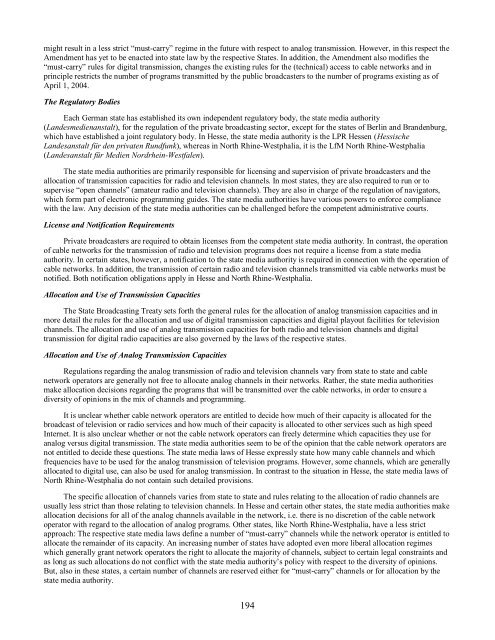iesy Repository GmbH - Irish Stock Exchange
iesy Repository GmbH - Irish Stock Exchange
iesy Repository GmbH - Irish Stock Exchange
Create successful ePaper yourself
Turn your PDF publications into a flip-book with our unique Google optimized e-Paper software.
might result in a less strict “must-carry” regime in the future with respect to analog transmission. However, in this respect the<br />
Amendment has yet to be enacted into state law by the respective States. In addition, the Amendment also modifies the<br />
“must-carry” rules for digital transmission, changes the existing rules for the (technical) access to cable networks and in<br />
principle restricts the number of programs transmitted by the public broadcasters to the number of programs existing as of<br />
April 1, 2004.<br />
The Regulatory Bodies<br />
Each German state has established its own independent regulatory body, the state media authority<br />
(Landesmedienanstalt), for the regulation of the private broadcasting sector, except for the states of Berlin and Brandenburg,<br />
which have established a joint regulatory body. In Hesse, the state media authority is the LPR Hessen (Hessische<br />
Landesanstalt für den privaten Rundfunk), whereas in North Rhine-Westphalia, it is the LfM North Rhine-Westphalia<br />
(Landesanstalt für Medien Nordrhein-Westfalen).<br />
The state media authorities are primarily responsible for licensing and supervision of private broadcasters and the<br />
allocation of transmission capacities for radio and television channels. In most states, they are also required to run or to<br />
supervise “open channels” (amateur radio and television channels). They are also in charge of the regulation of navigators,<br />
which form part of electronic programming guides. The state media authorities have various powers to enforce compliance<br />
with the law. Any decision of the state media authorities can be challenged before the competent administrative courts.<br />
License and Notification Requirements<br />
Private broadcasters are required to obtain licenses from the competent state media authority. In contrast, the operation<br />
of cable networks for the transmission of radio and television programs does not require a license from a state media<br />
authority. In certain states, however, a notification to the state media authority is required in connection with the operation of<br />
cable networks. In addition, the transmission of certain radio and television channels transmitted via cable networks must be<br />
notified. Both notification obligations apply in Hesse and North Rhine-Westphalia.<br />
Allocation and Use of Transmission Capacities<br />
The State Broadcasting Treaty sets forth the general rules for the allocation of analog transmission capacities and in<br />
more detail the rules for the allocation and use of digital transmission capacities and digital playout facilities for television<br />
channels. The allocation and use of analog transmission capacities for both radio and television channels and digital<br />
transmission for digital radio capacities are also governed by the laws of the respective states.<br />
Allocation and Use of Analog Transmission Capacities<br />
Regulations regarding the analog transmission of radio and television channels vary from state to state and cable<br />
network operators are generally not free to allocate analog channels in their networks. Rather, the state media authorities<br />
make allocation decisions regarding the programs that will be transmitted over the cable networks, in order to ensure a<br />
diversity of opinions in the mix of channels and programming.<br />
It is unclear whether cable network operators are entitled to decide how much of their capacity is allocated for the<br />
broadcast of television or radio services and how much of their capacity is allocated to other services such as high speed<br />
Internet. It is also unclear whether or not the cable network operators can freely determine which capacities they use for<br />
analog versus digital transmission. The state media authorities seem to be of the opinion that the cable network operators are<br />
not entitled to decide these questions. The state media laws of Hesse expressly state how many cable channels and which<br />
frequencies have to be used for the analog transmission of television programs. However, some channels, which are generally<br />
allocated to digital use, can also be used for analog transmission. In contrast to the situation in Hesse, the state media laws of<br />
North Rhine-Westphalia do not contain such detailed provisions.<br />
The specific allocation of channels varies from state to state and rules relating to the allocation of radio channels are<br />
usually less strict than those relating to television channels. In Hesse and certain other states, the state media authorities make<br />
allocation decisions for all of the analog channels available in the network, i.e. there is no discretion of the cable network<br />
operator with regard to the allocation of analog programs. Other states, like North Rhine-Westphalia, have a less strict<br />
approach: The respective state media laws define a number of “must-carry” channels while the network operator is entitled to<br />
allocate the remainder of its capacity. An increasing number of states have adopted even more liberal allocation regimes<br />
which generally grant network operators the right to allocate the majority of channels, subject to certain legal constraints and<br />
as long as such allocations do not conflict with the state media authority’s policy with respect to the diversity of opinions.<br />
But, also in these states, a certain number of channels are reserved either for “must-carry” channels or for allocation by the<br />
state media authority.<br />
194

















